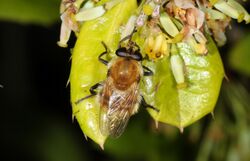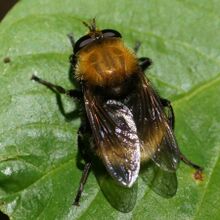Biology:Criorhina berberina
| Criorhina berberina | |
|---|---|

| |
| Criorhina berberina oxyacanthae female | |
| Scientific classification | |
| Domain: | Eukaryota |
| Kingdom: | Animalia |
| Phylum: | Arthropoda |
| Class: | Insecta |
| Order: | Diptera |
| Family: | Syrphidae |
| Subfamily: | Eristalinae |
| Tribe: | Milesiini |
| Subtribe: | Criorhinina |
| Genus: | Criorhina |
| Species: | C. berberina
|
| Binomial name | |
| Criorhina berberina (Fabricius, 1805)[1]
| |
| Synonyms | |
Criorhina berberina is a species of hoverfly. It is found in the Palaearctic from Fennoscandia South to Iberia and Italy. Ireland eastwards through Europe into Turkey and European Russia [6] .[7][8] C. berberina is a bumblebee mimic. The body has uniformly long dense pubescence, obscuring the ground-colour. There are two forms one with the pubescence more or less extensively blackish (typical berberina), one in which it is entirely yellow or tawny (berberina var. oxyacanthae Meigen). Criorhina differ from other bumblebee mimics - Mallota, Arctophila, Pocota and Brachypalpus by the form of their antennae: the first segments are thin and form a stalk, the third segment is shorter than it is wide. In Criorhina, the face projects downwards, in contrast to Pocota and Brachypalpus.[9] [10] [11][12]
Larvae of C. berberina are associated with rotting deciduous wood. The larva is figured by Hartley (1961) [13] and Rotheray (1993) [14] Adults are arboreal and found in most categories of both coniferous and deciduous forest with overmature trees and are seen visiting flowers to feed.[15][16] These include white umbellifers, Allium ursinum, Cornus sanguinea, Crataegus, Euonymus, Filipendula, Frangula alnus, Hypericum, Lonicera xylosteum, Photinia, Ranunculus, Rhamnus catharticus, Rhododendron, Rosa, Rubus idaeus, Salix, Sorbus, Taraxacum and Viburnum opulus.[17] The flight period is May to July . C. berberina is a bioindicator.
References
- ↑ 1.0 1.1 Fabricius, Johann Christian (1805). Systema antliatorum secundum ordines, genera, species. Bransvigae: Apud Carolum Reichard. pp. i-xiv, 1–373. https://www.biodiversitylibrary.org/item/53432#page/9/mode/1up. Retrieved 5 June 2020.
- ↑ 2.0 2.1 Meigen, Johann Wilhelm (1822). Systematische Beschreibung der bekannten europäische n zweiflugeligen Insekten. Hamm: Dritter Theil. Schulz-Wundermann. pp. x, 416, pls. 22–32. https://www.biodiversitylibrary.org/item/49298#page/7/mode/1up. Retrieved 14 April 2019.
- ↑ Schirmer, K. (1913). "Zwei neue Dipteren aus dem Norden und Suden Europas". Wiener Entomologische Zeitung 32: 221-222.
- ↑ Perris, E. (1839). "Notice sur quelques diptères nouveaux". Annales de la Société Entomologique de France 8: 47-57. https://www.biodiversitylibrary.org/page/33709922#page/63/mode/1up. Retrieved 4 August 2021.
- ↑ Macquart, P.J.M.. Insectes diptères du nord de la France. Syrphies.. 1829. Lille: "1827". pp. 223 pp., 4 pls. https://www.biodiversitylibrary.org/item/250269#page/9/mode/1up. Retrieved 16 July 2021.
- ↑ Fauna Europaea
- ↑ Stubbs, Alan E.; Falk, Steven J (1983). British Hoverflies: An Illustrated Identification Guide (2nd ed.). London: British Entomological and Natural History Society. pp. 253, xvpp. ISBN 1-899935-03-7.
- ↑ Peck, L.V. (1988) Syrphidae. In: Soos, A. & Papp, L. (eds.) Catalogue of Palaearctic Diptera, 8: 11-230. Akad.Kiado, Budapest.
- ↑ Van Veen, M. (2004) Hoverflies of Northwest Europe: identification keys to the Syrphidae. 256pp. KNNV Publishing, Utrecht.addendum
- ↑ Van der Goot,V.S. (1981) De zweefvliegen van Noordwest - Europa en Europees Rusland, in het bijzonder van de Benelux. KNNV, Uitgave no.32: 275pp. Amsterdam.
- ↑ Bei-Bienko, G.Y. & Steyskal, G.C. (1988) Keys to the Insects of the European Part of the USSR, Volume V: Diptera and Siphonaptera, Part I. Amerind Publishing Co., New Delhi. ISBN:81-205-0080-6.
- ↑ Coe, R.L. (1953) Diptera: Syrphidae. Handbks.ident.Br.insects, 10(1): 1-98. R.ent.Soc.London. pdf
- ↑ Hartley, J.C. (1961) A taxonomic account of the larvae of some British Syrphidae. Proc.zool.Soc.Lond.,136: 505-573.
- ↑ Rotheray G., 1993 Colour Guide to Hoverfly Larvae Diptera, Syrphidae in Britain and Europe Dipterists Forum pdf
- ↑ Speight, M.C.D. (2011). "Species accounts of European Syrphidae (Diptera)". Syrph the Net, the Database of European Syrphidae 65: 285pp. http://www.diptera.info/downloads/StN_Species_Accounts_Glasgow_2011.pdf.
- ↑ Ball, S.G.; Morris, R.K.A. (2000). Provisional atlas of British hoverflies (Diptera, Syrphidae). Monks Wood, UK: Biological Records Centre. pp. 167 pages. ISBN 1-870393-54-6.
- ↑ de Buck, N. (1990) Bloembezoek en bestuivingsecologie van Zweefvliegen (Diptera, Syrphidae) in het bijzonder voor België. Doc.Trav. IRSNB, no.60, 1-167.
External links
Wikidata ☰ Q5185811 entry


